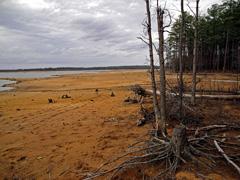Last March, Wake County began to suffer from the effects of an abnormally dry season. In May, the county slipped into moderate drought conditions. By August, with only 4.3 inches of precipitation falling in Raleigh, the county plunged into extreme drought — leaving the barren shores of Falls of the Neuse dry and cracked.
And six months later, with the drought’s effects still apparent, some students are working to conserve water. Others, however, aren’t exactly sure how they can make a difference in their daily lives.
“I want to conserve water, but it’s hard for me because I live in a dorm,” Hannah Burke, freshman in chemical engineering, said. “It’s almost too much of a hassle to try.”
But Kelly Porter, an environmental educator at the N.C. Water Resources Research Institute, said there are simple ways students can reduce the amount of water they use.
“Everyone should be aware if how they use water, and take into consideration the advice given by Governor [Mike] Easley,” she said.
Easley encouraged residents to conserve water using simple methods — some of which have minimum impact on students’ day-to-day routines — such as turning off the water while brushing their teeth and lathering in the shower. Students could also keep a pitcher of water in their refrigerators instead of running the tap.
Students should also time their showers to keep them as short as possible, according to George Hess, an associate professor of forestry.
“I can’t tell you how many faculty and students I see in the gym still letting the water run the whole time they are in the shower — sometimes for more than 10 minutes,” he said.
Facilities across campus are also making efforts to conserve. According to Chancellor Oblinger’s “Chancellor’s Corner,” housekeeping services on campus have cut back on their water consumption, using half the amount of water previously used. Maintenance also installed new aerators — which release half a gallon of water per minute compared to two gallons a minute without aerators — on faucets in residence halls. Housing will also install low-flow showerheads soon.
And if facilities aren’t actively taking steps toward conserving water, many are making efforts to alert students to how they can conserve. Carmichael Complex employees, for instance, have placed signs throughout the gym reminding students and faculty to turn off water while lathering.
No matter their location on campus, students can learn to cut back on water consumption.
“When every drop counts, it helps to have students involved in the cause,” Kathy Jameson, freshman in communication, said.
Extreme drought
The North Carolina Drought Management Advisory Council urgently advises all water users in the counties that are indicated on the US Drought Monitor Map of North Carolina as suffering from Exceptional Drought conditions to enact the following precautions in addition to previous advisories until further notice:
– Limit water usage to those uses that are essential to ensure public health and safety.- Prepare for the likelihood of community water systems requiring water rationing.- Participate in regional and local coordination for the management of water resources.- Stay informed on drought conditions and advisories.
SOURCE: ncdrought.org
Conserve water
In the Bathroom- Replace older plumbing fixtures with newer, low-flow models or install water-saving devices, such as faucet aerators.- Place a water-filled plastic bottle in your toilet tank to reduce the amount of water needed to fill it.- Put food coloring in your toilet tank and watch if the coloring shows up in the toilet bowl before flushing. If so, replace the leaking flap.- Check tub and sink faucets for drips and replace washers and “O-rings” as necessary.- Turn off all water to your home and look at the readout dial on your water meter. If the dial moves, you have a leak.- Check pipes coming into the house for leaks and have them repaired immediately. Don’t forget to check outside faucets and garden hoses.- Turn off water while lathering, shampooing, shaving and brushing your teeth.- Plug the bathtub before turning the water on, and then adjust the temperature as the tub fills up.- Take showers instead of baths.- Time your shower to keep it as short as possible.- Collect water from the bath/shower while waiting for it to heat up and use it to water plants.
In the Kitchen- Run washing machines and dishwashers only with full loads to maximize efficiency.- Avoid using sink disposals for food scraps. Composting food scraps is much more economical than using a garbage disposal.- Don’t rinse dishes before putting them in the dishwasher, or use a pan of water in the sink and re-use the water as long as possible.- When washing dishes by hand, fill one sink with wash water and the other with rinse water.- When washing dishes by hand, use the least amount of detergent possible. This minimizes rinse water needed.- Keep a pitcher of water in the refrigerator instead of running the tap for cold drinks.- Don’t defrost frozen foods with running water. Either plan ahead by placing frozen items in the refrigerator overnight or defrost them in the microwave.- Don’t let the faucet run while you clean vegetables. Rinse them in a filled sink or pan.
Reuse and recycle- Catch rainwater from your gutters with a rain barrel and use it to water your flowers and vegetables.- Collect natural water with a rain barrel for car washing.
Outdoors- Take time to locate your main water shut-off valve and the water meter in your yard. – Use dry cleanup methods to reduce both indoor and outdoor water use.- Use a broom instead of a hose to clean your driveway or sidewalk.- Set lawn mower blades one notch higher. Longer grass means less evaporation.- Put a layer of mulch around trees and plants. Chunks of bark, peat moss or gravel slow down evaporation.
Education- Put up signs around your home and office to remind others to conserve water.
SOURCE: p2pays.org




